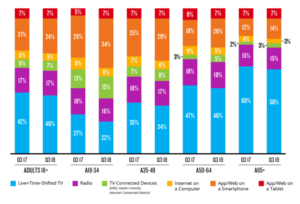In today’s fragmented media landscape, it can be difficult for healthcare companies to figure out what type of marketing agency is a good fit for their needs. Medical websites face unique challenges like HIPAA compliance, managing a variety of different stakeholders, and humanizing complex health information in a way that’s approachable to patients and caregivers.
This adds further complexity to working with agencies that may provide the needed service but cannot be effective without healthcare expertise or vice versa.
In this post, we’ll list a few ways that healthcare companies can work with a marketing agency to fill long term, short term, and ad hoc needs as well as address talent gaps within their organization. We’ll also outline a few different agency structures that you may encounter when searching for a marketing agency to meet your needs.
Emerging agency models
The ad agency industry is in a state of flux. The traditional models that once dominated the industry no longer make sense in a consumer landscape that’s hyper fragmented. In May of this year, Nielsen reported that U.S. consumers spend almost half of every day interacting with media, but the type of media and how they consume it involves a host of devices and services. This chart from Nielsen breaks down daily media consumption by platform from Q3 2017 through Q3 2018.
Add to this that technology has made it increasingly easier for marketers to move a variety of tasks in-house rather than outsourcing them to third-party vendors, and it can be challenging to understand how an agency fits within your overall marketing strategy.
We’ve also entered an age of efficiency where clients, rightfully, don’t want to pay for large agency overheads or services they don’t need. Outdated reimbursement models that charge a percent of spend on media buys or lock companies into high monthly retainers are motivating marketers to bring their creative projects in-house more than ever.
In 2018, Unilever did just this, saving 30% in production costs using an in-house model. But bringing all marketing and creative tasks in house isn’t always viable or even cost effective. The case can be made for working with a smaller, more focused agency for tasks such as web development, content creation, and SEO which can be easily outsourced.
Here are three typical agency models you may come across when searching for a healthcare marketing agency.
- The consulting/strategic agency. Consulting agencies often focus more on strategy and planning than execution. They may work with your internal programming team, for example, to develop and update your website. They may bring in consultants or white label a service that they don’t offer directly or even refer you to another vendor for a specific task or initiative.
- The local boutique agency. Marketing campaigns that focus on medical practices and smaller providers tend to be hyper localized which is where boutique agencies can really shine since they’re familiar with their community’s needs and emotional territory. Even large healthcare companies like big hospital chains can benefit from working with boutique agencies versus large national holding companies. Boutique agencies are typically more efficient in terms of how the agency itself is run and more aware of the nuances involved with a locally targeted campaign. Many boutique agencies work with smaller clients and are flexible about price agreements and structure. The downside to working with a boutique agency is that they may not offer every single service you need. But in that case, you can still benefit from their local expertise by working with them as a consulting agency.
- The all-inclusive mid-sized/large shop. All-inclusive marketing agencies provide a variety of services in house from strategic planning, website development, creative development (e.g., video, photos, and content) to digital marketing services. These agencies are usually (though not always) bigger than boutique agencies. Though their size and roster of clients may be impressive, they tend to lack knowledge about hyper-local campaigns, have a high overhead, and may not assign experienced staff to work on smaller projects. The upside is that all-inclusive agencies often have experience across multiple industries. They also offer the convenience of a one-stop shop.
Here are some creative ways that healthcare companies can work with any of the above agencies, assuming the agencies are willing.
The time sensitive “in a pinch” project: Sometimes you need to get only one thing done—maybe it’s a piece of content that needs to be written or a Facebook campaign created and launched two weeks before a major event.
When last minute projects arise, your existing agency can be your best resource even if they’re not actively working on anything with you. This is particularly true if you’ve had a longstanding relationship with an agency that you trust. Consider reaching out to them for ad hoc projects that can be priced on a per project or hourly basis. Make sure you get a clearly defined scope of work that states the exact nature and time frame of what’s needed.
The gap filler: Your marketing agency can be an essential resource for filling internal staffing gaps, particularly during crunch times like the holidays when people may be on vacation or otherwise unavailable.
This can be presented as a short- or long-term solution to help you fill a specific staffing need (e.g., managing your paid search campaign or social media ads). Agencies can help you move a specific service or task in house by providing training and insight before handing over the reins.
The flexible retainer: Retainers don’t have to be one-size fits all. Hours and services can be flexible based on your needs. One novel way to get the most out of your agency retainer is to make sure that you’re only billed for the hours that are used each month and that you’re constantly evaluating the scope of work to make sure that you’re getting the services you most need when you most need them.
You can also ask for a 30 day out clause so that even though you’re committed to a monthly minimum of hours, you’ll be able to minimize any loss by cancelling the retainer with 30 days’ notice.
Conclusion
There are many ways that health care companies work with agencies from the all-in-one agency of record that can do everything to smaller niche agencies that focus on a specific service like search engine optimization or video marketing. The bottom line should always be to prioritize working with an agency as a partner who can fill talent gaps, provide backup and expertise, and be flexible based on your current needs.


